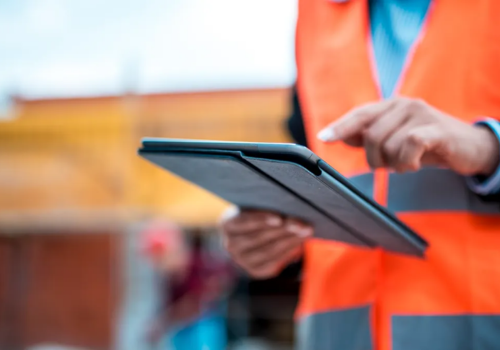
Startups focused on improving jobsite safety, streamlining workforce management, and cutting construction emissions attracted significant venture capital in the second quarter of 2025. In total, six promising contech companies raised $101 million in new funding rounds, underscoring investors’ growing confidence in construction technology’s role in solving some of the industry’s most pressing challenges.
From AI-powered procurement and operations platforms to decarbonized cement and asbestos tailing transformation, these startups reflect a diverse range of innovations reshaping how construction gets done.
Below are the six startups that secured major investments this quarter:
Location: Dubai, United Arab Emirates
WakeCap, a project intelligence platform that integrates smart sensors with jobsite safety and productivity tools, raised $28 million in a Series A funding round announced on May 13.
The company’s wearable sensors attach to construction hard hats and transmit real-time data back to WakeCap’s proprietary platform. This includes information on worker access, equipment use, safety alerts, and progress metrics.

According to the company’s website, the technology enables clients to reduce safety incidents by 91%, increase productivity by 25%, and respond to incidents 70% faster.
The newly raised capital will support WakeCap’s expansion into new and existing markets, enhance its product features, grow its team, and build more integrations with construction management software platforms.
Location: San Francisco, California
Field operations and finance management platform Miter secured $23 million in a Series B funding round led by Bessemer Venture Partners and Coatue Management. Announced on May 19, the new investment brings the startup’s total funding to $38 million.
Miter provides a cloud-based platform that unifies HR, payroll, finance and operations in one system tailored for contractors. Designed to replace legacy desktop software and generic business tools, Miter enables digital transformation for construction firms still relying on outdated systems.
Key features include job costing, payroll compliance, employee onboarding, time tracking, expense management and benefits administration. The firm said builders using its software can save between 20 to 40 hours per week on payroll processing alone.
Location: United Kingdom
London-based Converge, a technology firm using artificial intelligence to revolutionize concrete management and cut emissions, raised $22 million in funding, according to a May 21 announcement.
Its flagship solution, ConcreteDNA, leverages AI to optimize concrete mix designs, monitor concrete strength in real time, and provide actionable insights that improve both performance and sustainability.
“The offering helps builders make faster, data-driven decisions, reduce embodied carbon and minimize resource waste,” the company said in the release.
With the latest funding, Converge plans to expand its commercial footprint and continue developing its ConcreteDNA platform.
Location: Montreal, Quebec
Canadian startup Exterra announced a 20 million Canadian dollar ($14.5 million USD) funding round on May 6 to advance its work transforming mining waste into sustainable construction materials.
Exterra uses proprietary technology in two key areas. One process converts mining waste into low-carbon metal oxides and by-products. The other mineralizes carbon dioxide in a single-step method that doesn't require conventional carbon capture systems.
To further its sustainability efforts, Exterra leverages Quebec’s low-carbon hydroelectric power to manufacture in-demand co-products like amorphous silica, a key component in environmentally friendly building materials.
The company’s strategy includes building what it says will be the world’s largest asbestos mitigation facility — its Hub I project — set to begin construction in 2027. The facility will be capable of processing more than 300,000 tons of asbestos mine tailings annually.
Location: Charlotte, North Carolina
Procurement automation startup Field Materials closed a $10.5 million Series A funding round on April 30, bringing its total funding to $19 million.
The company has developed an AI-powered platform that automates the tedious task of processing vendor quotes, delivery slips and invoices. Using proprietary large language models, Field Materials extracts data and integrates it into nine major construction accounting platforms.
According to the company, this reduces purchase order and invoice processing time by 90%, helps contractors secure volume pricing, and improves profit margins.
Field Materials already works with large construction clients including Swinerton, Teichert and Big-D Construction. The company said it plans to use the latest funding to double its staff and triple its revenue in 2025.
Location: Somerville, Massachusetts
Sublime Systems, a low-carbon cement maker, received a $3 million investment from Suffolk Technologies, the venture capital arm of Suffolk Construction, as announced in a May 20 news release.
Sublime’s breakthrough lies in its replacement of traditional high-temperature cement kilns with an electrochemical process that operates at ambient temperatures. This innovation significantly reduces carbon emissions associated with cement production.
“The process has the potential to achieve cost parity at scale with conventional Portland cement,” according to the company.
Sublime recently signed a long-term agreement with Microsoft, which will purchase the firm’s low-carbon cement to help meet its sustainability goals. In addition, the U.S. Department of Energy selected the company last year for up to $87 million in federal support to accelerate construction of a commercial-scale facility in Holyoke, Massachusetts.
These six startups represent a growing wave of contech innovation tackling some of construction’s toughest problems — from emissions and inefficiencies to safety and legacy systems. As global demand for sustainable and productive building practices grows, so too does investor interest in the tech startups that can make it happen.
Whether it’s AI that speeds procurement, sensors that prevent jobsite accidents, or technologies that replace carbon-heavy materials, the second quarter of 2025 showed that construction tech is not just booming — it’s building the future.
Originally reported by Matthew Thibault in Construction Dive.